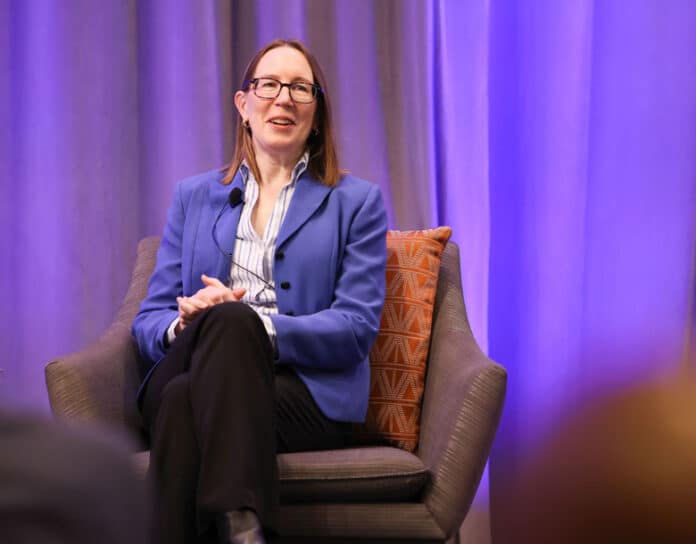SEC Commissioner Hester Peirce recently said she would like to see the accredited investor standard eliminated, which would make it easier for retail investors to access private markets.
Peirce was responding to questions during a fireside chat held May 20 at the Financial Services Institute’s Forum & Capitol Hill Day in Washington. FSI President and CEO Dale Brown had asked her to elaborate on her comment about wanting more Americans to have access to wealth-creation, and to share her thoughts about the role of the accredited-investor definition.
“I would like to see elimination of the accredited investor standard,” Peirce replied. “That is not a decision that everyone shares, but it’s something that I hear a lot about from investors. They’re very offended that the fact that they don’t have a lot of money means that they’re shut out from a huge part of the market.”
Investors may qualify as accredited if their net worth exceeds $1 million (excluding the value of a primary residence), or if they earned more than $200,000 ($300,000 with a spouse or partner) in each of the prior two years and reasonably expect to again this year.
How it Could Work
Peirce, sworn in as a commissioner in 2018, doesn’t anticipate that retail investors – who are less likely to receive financial advice than their wealthier counterparts — would flock toward private-markets investments that are now off limits to them. These investments include private equity, private credit, hedge funds, venture capital, real-estate syndications and more.
“If we lifted the accredited investor limitation and said anyone can invest in private markets, I don’t think everyone would,” said Peirce, “but I think that people who wanted to do more to understand private investments, giving them access would be a better approach.”
More likely, “we’ll make it easier for private retail investors to access the private markets through diversified funds with professional managers,” she said. However, “I think most people are still going to want to do most of their activities in the public markets.”
Earlier she said that involving more people involved in the capital markets “is something that we need to keep working on … it’s good for them; it’s also good for the economy.”
The Right Path to Efficiency
When Brown mentioned the new Department of Government Efficiency (DOGE) and asked Peirce about the idea of improving government efficiently, she responded that there are always ways to make large organizations more efficient.
To improve its efficiency, the SEC needs to “try to take a step back” and think about where it can “really add value and where it doesn’t add value, and that’s a question we should be asking every time we take an action as an agency,” Peirce said. More specifically, “is there a problem here? If so, is this a problem that the private markets can solve on their own, and are they working to solve those problems? Is there something that we’re doing as a regulator that’s actually creating the problem that we can do away with, or is this really an area where the SEC needs to come in with a regulation that tells people what to do?”
Although the SEC has “lost a fair number of people in recent months, we have a deep bench of talent,” Peirce added. She noted that remaining employees are filling in the gaps by learning new skill sets and taking on new leadership roles. “We have a really great, devoted workforce at the SEC, and they will be up to the task.”
Room for Improvement
As for areas of improvement, “I think we need to do a better job working with state insurance regulators,” said Peirce.
“We also have been offloading more and more of our regulatory responsibilities for FINRA and that, I actually think is not such a great idea,” she said. “We need to keep a pulse on the market … we need to be more careful about what we decide makes sense for FINRA to do.”
When asked for an example of where she thinks the SEC has ceded too much responsibility to FINRA, Peirce said that large traders who don’t have customers are now at Finra. Additionally, Finra is now tasked with collecting securities-lending data, she said.
Looking Ahead
Some areas Peirce that said she thinks will be on the agenda under the leadership of Paul Atkins, the new SEC chair, include capital formation (looking at why the U.S. doesn’t have as many companies going public), consolidated audit trail and executive compensation disclosure.
“We already have the consolidated audit trail, which I think goes too far in monitoring the activities of Americans [when] there’s no suspicion that they’ve done anything wrong,” she said.”All of a sudden, every transaction they’re engaged in is being watched.”
She’d also like the SEC to do more to help firms figure out practical ways to fix problems rather than just slapping them with enforcement actions without offering tangible guidance. For example, she said that sitting down and looking at the record-keeping rules could help firms find a way to better capture data shared through off-channel communications – a problem that surged as more employees began working from home during the pandemic.
“There are a lot of very tricky issues there. You don’t want to have to have your employees turn over their personal cell phones to you for periodic reading of all their messages.” said Peirce. And “using the enforcement hammer isn’t the best way to do things … humans are not going to be perfect, so really it didn’t help people figure out the right solution.”
More Feedback Welcome on the Marketing Rule
Toward the end of the fireside chat, Peirce responded to audience questions on many topics including the SEC Marketing Rule, AI, cryptocurrency, Reg BI, elder abuse and more.
She noted that the SEC’s recently published answers to frequently-asked questions on the Marketing Rule should provide some clarity there. “I’m certainly open to hearing more feedback and ways that we can improve that rule, whether that’s through providing additional guidance, or if people feel that there needs to be changes to the actual rule,” she said.
Still Figuring out AI and Crypto
With AI, “I don’t want to jump right in the regulatory solution until I understand what the problem is,” said Peirce. The financial industry needs to work together on better understanding AI, which continues to evolve and is sometimes used to conduct “really sophisticate scams,” she said. “Once someone’s been scammed, one reaction is just to pull entirely away from the financial industry, because people may stop trusting anyone.”
“So, we want to go after bad actors,” she said. And while AI can also be very helpful for the SEC, especially with its now-limited exam staff, “I think we have to put governors on ourselves as regulators on how we use AI,” she added. “I do want to be careful, because new technology makes it much easier for us to set up a massive surveillance state.”
Peirce also noted that the SEC has set up a crypto task force and is trying to help firms figure out this space even though many pieces regarding crypto fall outside the agency’s scope. “We’re kind of telling people, ‘Look, this isn’t us,’” she said, “That’s helpful for investors to know if you’re buying a game coin, you shouldn’t expect that the full panoply of SEC protections is going to be there for you.”
Advisors Can Change the World
Peirce and Brown also chatted about the challenge and urgency of recruiting the next generation of advisors.
“We have these wonderful capital markets, and they really can transform families’ lives, and so I think one piece of this is encouraging young people who want to change the world that this is an industry where you actually can do it in a very real way,” said Peirce. “If more people understood that, I think you’d see more interest in young people going into the profession.”
Jerilyn Klein is editorial director of Rethinking65.







